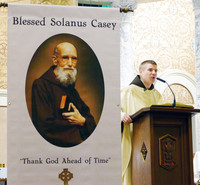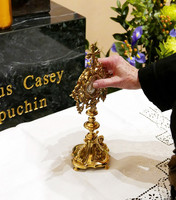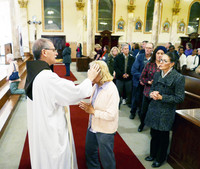


My hunch that the celebration for newly Blessed Capuchin Father Solanus Casey at Sacred Heart Church in Yonkers would be a special one turned out to be right on the mark.
The monastery church on Shonnard Place is one of three parishes in the archdiocese where Father Solanus served during the first half of the 20th century. He was a sacristan and a porter there 1904-1918. Those were actually his first assignments as a Capuchin Franciscan priest.
He would go on to serve at Our Lady of Sorrows and Our Lady Queen of Angels, both in Manhattan, and in the Diocese of Brooklyn at St. Michael’s in Brooklyn’s East New York section.
He is more famously remembered from his 21 years as the porter of St. Bonaventure Monastery in Detroit, and his beatification took place at Ford Field in the Motor City last Saturday, Nov. 18.
New Yorkers surely hold a special place for him in their hearts.
A peaceful presence was apparent from the moment I entered Sacred Heart on Saturday. I was actually a few minutes late for an interview with Father Matthew Janeczko, O.F.M. Cap., the parish’s young pastor, who was already listening to confessions by the time I arrived. That gave me a chance to look around the darkened church, where a shrine to Blessed Solanus was ready to host visitors who would venerate a first-class relic after the 5 p.m. Vigil Mass in his honor.
Approaching the front of the church, banners with Father Solanus’ image were positioned on both sides of the altar in front of the sanctuary. Two of his well-known phrases, “Blessed Be God in All His Designs” and “Thank God Ahead of Time,” served as apt taglines.
It was good to have some time to pray quietly for the blessing Solanus has been for the Church for more than 100 years, and for me personally in recent years. A few things stand out about Father Solanus, in his own quiet way. A lot has been made of what he did not possess. He had a hard time with academics in school and had difficulties with languages as he studied for the priesthood. When he was ordained, it was with the proviso that he would not preach or hear confessions.
Father Janeczko did a good job, in his homily, explaining what made Father Solanus special. Drawing on the day’s Gospel from St. Matthew, he showed how Father Solanus used the “one talent” he possessed—“a heart that listened,” especially to the poor and downtrodden.
“He listened in Detroit, in East New York and here in this very church,” Father Janeczko said.
That gift of listening makes the friar very much a saint for our times, Father Janeczko said, when people are so consumed with delivering stories to the world by every possible means they often fail to hear the needs of others right in their midst.
Father Solanus did not make grand and eloquent statements about solving the world’s intractable problems, Father Janeczko said.
“He gave simple words of advice, to seek the greatest of all treasures…God is active and present in our lives, dark as the world may seem.”
The parish church was filled with prayer that evening. After Mass, there was exposition of the Blessed Sacrament, and Capuchin priests offered anointing of the sick and listened to confessions. At the back of the church, people who had just venerated Solanus’ relic shared some brief reflections before they exited.
Bonnie Valenti, who was with a young granddaughter, said Father Solanus helped her to return to the Church as a young adult some time ago. “He is the simplicity that God is. Many people have been touched through him.”
For Brian Carty, a custodian at St. Gabriel School in the Riverdale section of the Bronx, the connection was forged in a book about Father Solanus called “The Porter of St. Bonaventure’s.”
Carty and his wife, Mary, both natives of Ireland, said they could relate to Father Solanus’ life as one of 16 kids of a Wisconsin farming couple. “We’re farmers’ kids, too,” he said.